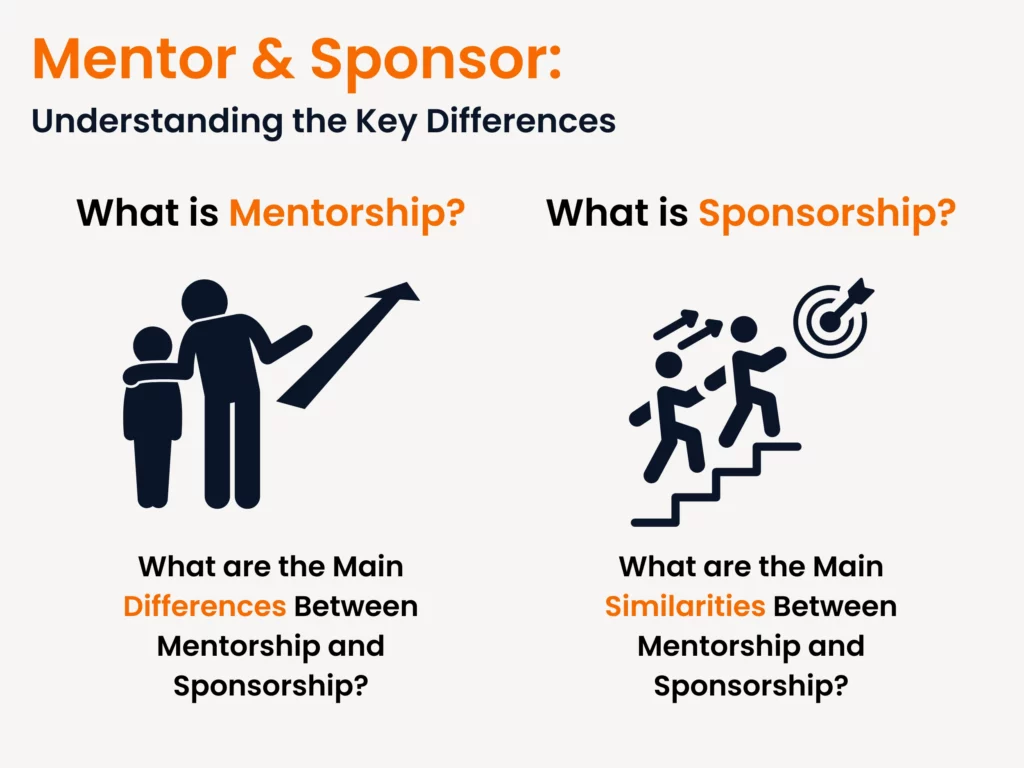
Navigating career development often involves the support of others. Two key roles in this journey are mentors and sponsors, each providing unique advantages. The significance of mentor and sponsor in career development has grown in the current dynamic professional environment. Sponsorship and mentoring both have important roles to play in helping people advance professionally, but they do it in different ways. Professionals may utilize better use of these relationships by knowing the distinction between sponsorship and mentorship.
What is Mentorship?
Usually referred to as the mentee, mentoring is the connection whereby a more experienced professional guides, advises, and supports a less experienced person. Often, mentoring focuses on long-term personal and professional growth. A mentor guides their mentee toward decisions, job obstacles, and skill development required for professional advancement.
Typically in a mentoring program, the mentor provides their knowledge, ideas, and experiences to assist the mentee develop. Often informal, this connection regards the mentor as a trusted adviser who provides guidance and support rather than directly forwarding the mentee’s career. Mentoring might have as its objectives improving particular talents, boosting self-confidence, or just offering emotional support at trying circumstances.
To promote a culture of ongoing education and professional growth, several companies provide mentoring programs right there in the workplace. Both mentors and mentees gain from these initiatives; mentors can hone their leadership and communication abilities while mentees get insightful direction for negotiating their careers.
What is Sponsorship?
Conversely, sponsorship entails a senior professional actively promoting the career progress of another, usually with influence and authority. Sponsorship is about acting to directly assist the sponsored person’s career, unlike mentoring, in which advice and direction predominate. Using their position, contacts, and authority inside a company, a sponsor helps the protégé acquire new prospects, visibility, or safe promotions.
Because the sponsor personally participates in the success of the person they support, sponsorship is a more high-stakes relationship. Sponsors testify for their protege in significant places, such executive meetings or when promotions present their own. Sponsorship usually takes place when the sponsor regards the person being sponsored as someone with great potential to progress inside the company and is more formalized than mentoring.
Although they are less frequent than mentoring programs in the workplace, sponsorship initiatives there are vital for those hoping to occupy greater leadership roles. For underrepresented groups in the workplace, sponsorship is especially crucial since it gives them visibility and chances sometimes out of reach.
What are the Main Differences Between Mentorship and Sponsorship?
Although sponsorship and mentoring both seek to assist professional growth, their methods and results are somewhat different. Mentoring and sponsorship differ primarily in these ways:
Nature of the Relationship
Mentoring tends to be more informal, with the mentor providing advice, guidance and emotional support. On the other hand sponsorship, is more formal and involves active promotion of the sponsor’s career.
Focusing Areas
A mentor focuses on the mentee’s professional development, helping him or her build skills, expand knowledge, and make better decisions. A sponsor, on the other hand, focuses on advancing the mentee’s career by advocating for them at critical career moments.
Level of Involvement Rate
Mentors act as a sounding board, offering feedback and insights based on their own experiences. Sponsors take a more hands-on approach by leveraging their influence to help the protégé secure promotions, high-visibility projects, or new job opportunities.
Outcome of Mentorship & Sponsorship
The result of a mentoring relationship is often personal growth and skill development. In contrast, sponsorship results in tangible career advancement, such as promotions or raises, because the sponsor is actively involved in the sponsor’s success.
What are the Main Similarities Between Mentorship and Sponsorship?
Despite their differences, mentorship and sponsorship share several important similarities, particularly when it comes to their overall goal of supporting career development.
Mutual Trust and Respect
Both mentor and sponsor relationships are built on a foundation of trust and mutual respect. Whether mentor or sponsor, both parties must believe in the potential of the mentee. This trust is essential for providing guidance or advocating for advancement.
Career Growth
Both mentoring and sponsorship are aimed at fostering professional growth and development. Although the methods differ, the ultimate goal is to help individuals navigate their careers and succeed in their chosen fields.
Commitment to Success
Whether in the form of advice or representation, both mentors and sponsors are committed to the long-term success of the individual. In mentorship, this can take the form of providing guidance during challenging times. In sponsorship, it may involve using personal influence to secure career opportunities.
Leadership Development
Mentor & sponsor both play crucial roles in leadership development. Mentors help mentees build the skills and confidence needed to step into leadership roles, while sponsors actively advocate for the protégé’s placement in leadership positions.


